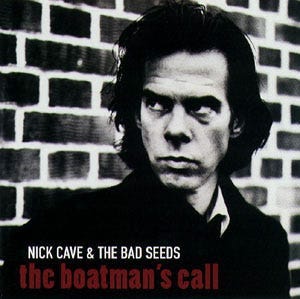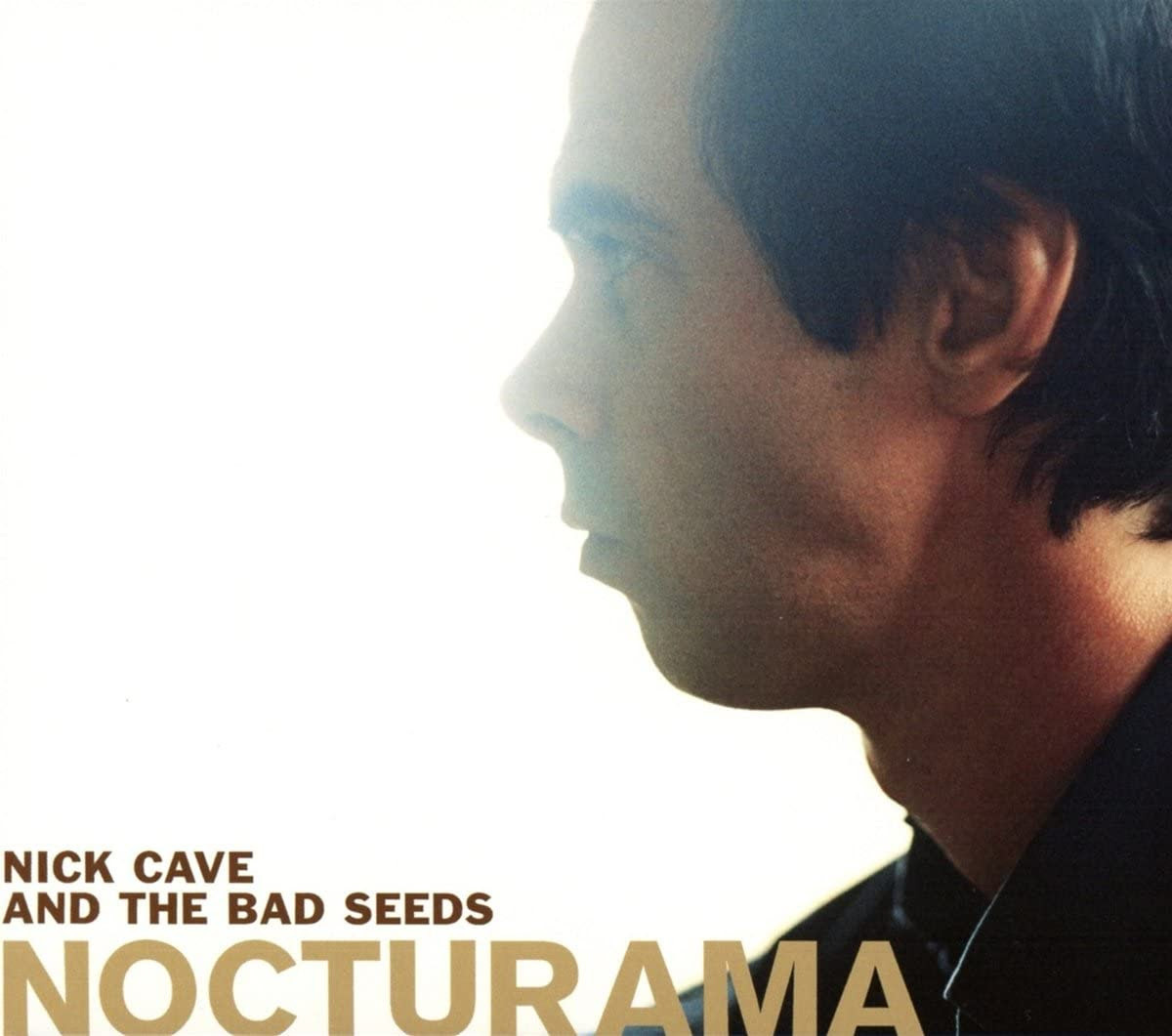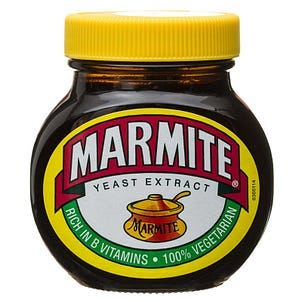Yesterday saw Act 2, part 1 of ‘s Odyssey on Nick Cave’s closing tracks
Act 1, parts 1 and 2 can be found here and here.
With the admin done, I’ll pass the mic….
The Boatman’s Call (1997) - ‘Green Eyes’
“Leave me to my enemied dreams.”
Why do we enjoy a good break-up record so much?
Well as Keats said, “truth is beauty,” and musicians are simply following a long poetic tradition of trading on the raw emotions of heartbreak, pouring them into great art. Or, as the NME put it, in a piece on their favourite albums of the genre, “there’s nothing like a romantic relationship dashed to bring out a musician’s most intimate feelings.”
Personally, I believe more than a dash of schadenfreude is at play. Given most of us have been there, don’t we sometimes just like to hear about somebody else’s suffering? Agreeing with me, in a quote remarkably suitable for this post, is Tom O’Connor (the journalist not the comedian!) who concludes, “we are nothing but emotional vampires, feasting off of their misery and loving every miserable minute.”
Whatever the answer, there’s no denying The Boatman’s Call is a truly great break-up record.
Released just a year after Murder Ballads, this collection couldn’t be more of a contrast. Any semblance of musical bombast has disappeared, in fact none of the twelve tracks here even features the full band. Sparse, minimalist instrumentation had become the order of the day, a direction the group have since needed to learn to live with. Even Warren Ellis, now a fully-fledged Bad Seed, only manages to add his violin (surely an instrument designed for melancholy!) to six of the songs.
But it is the words that become all important here, having too gone through a major overhaul. Gone, for the moment, are Cave’s usual character-based narratives, replaced by little more (for almost an hour) than Nick, his piano, and his soul!
There is a degree of conjecture online over the source of Cave’s angst on The Boatman’s Call, but while a hangover from the split with his ex-wife (and mother of his child) Viviane Carneiro may occasionally leak in, there is more than enough lyrical evidence to suggest the lion’s share of the album’s ‘naked soul-searching’ is driven by Nick’s brief, intense, ultimately ill-fated dalliance with a certain ‘West Country Girl’.
The beauty of The Boatman’s Call though is that it is by no means all doom and gloom. Instead we get treated to a full gamut of love’s emotions; from the heady anticipation of its first blossoming, through the frustrations and doubts as it slips away, to the whole panoply of passions that can be stirred by its ending.
With a clever sequencing of tracks, the album cycles (and recycles) us through this traumatic journey three times over:
‘Into My Arms’ starts the set optimistically, by foreseeing, “some kind of path, that we can walk down, me and you,” and carries this belief into a ‘Lime Tree Arbour’ where the wind in the trees is, “whispering low that I love her.” Cynicism soon arrives however in ‘People Ain’t No Good’ (inappropriately known in our house as ‘the Shrek song’) where the coming of winter has, “stripped the blossoms bare,” leaving Nick to concede, on the steps of the neo-classical ‘Brompton Oratory’, that he is (in the saddest line of an album packed full of them), “forlorn and exhausted, baby, by the absence of you.”
Faith is temporarily restored in ‘There Is a Kingdom’, before the question mark in ‘(Are You) The One I’ve Been Waiting For?’ implies this is unlikely to hang around for very long, a suspicion confirmed by ‘Where Do We Go Now But Nowhere?”
But it is the album’s closing emotional cycle that proves the most heart-wrenching and rancorous! ‘West Country Girl’ tallies up a new love’s attributes, including, “her lovely lidded eyes I’ve sipped,” with this attraction flowing over into her ‘Black Hair’ until, at its very end (and too soon!), “she took a train to the West.” By ‘Idiot Prayer’ bitterness has already set in with, “love, dear, is strictly for the birds,” and soon turns to anger in ‘Far From Me’, with one of my favourite ever put-downs in song, “you my brave-hearted lover, at the first taste of trouble went running back to mother.” Ouch!
Which all turns ‘Green Eyes’ into a smart choice for The Boatman’s Call’s run out grooves. Starting with a romantic request, from a love sonnet (by 16th Century French Renaissance poet Louise Labé), to, “kiss me again, rekiss me, and kiss me,” you might imagine the ‘green eyes’ in question to be another of the physical attractions listed earlier, but it quickly transpires the colour has instead taken on its figurative hue of jealousy. Forgiveness is not Nick’s business here; with the sonnet extract immediately trumped by the record’s nastiest line, “slip your frigid hands beneath my shirt,” and the album signing off with a request to, “be quiet as you are leaving, Miss.”
Concentrating on these lyrical themes may make The Boatman’s Call sound like a hard listen, but the reality couldn’t be further removed. With gentle instrumentation perfectly complementing the fatalistic mood, and Cave managing his most confident (and nuanced) vocal performance to date, the whole becomes an unqualified triumph …… and as ‘Exhibit A’ for the Defence, try this great live performance of ‘Far From Me’.
The Boatman’s Call, you suspect, could prove a hard act to follow.
No More Shall We Part (2001) - ‘Darker With the Day’
“I was looking for an end to this, for some kind of closure.”
Judging by the time it took, following up The Boatman’s Call was indeed a trial. Having released their first ten studio albums in just thirteen years (1984-1997) it then took The Bad Seeds another four before No More Shall We Part saw the light of day.
Mind you, a lot had happened in the meantime. In 1999 Nick married the model Susie Bick (“on the day of the eclipse”), with their twin sons born a year later. As you might expect (if not always in ways you would anticipate), such life-changing events often gate-crash the album’s lyrics.
To be clear up front; while it may be a minority view amongst Cave aficionados, No More Shall We Part is my favourite, most listened to, Bad Seeds album. Sometimes melancholic, occasionally euphoric, but always melodic!
I have long maintained the right ‘flow’ of songs is an essential component for a great album. When a band gets this right, everything fits together seamlessly; as each track fades you can already anticipate, and look forward to, the next intro. In this collection, Nick & his Bad Seeds almost (a caveat I’ll return to later!) achieve this to perfection.
After the mood pieces of The Boatman’s Call this album features a more narrative style of songwriting. In contrast to the ‘open-hearted’ surgical precision of its predecessor, we can instead marvel at Cave’s equal ability to weave ‘half a story’ into a song, but then step back, allowing the listener to fill in the gaps.
The opening track ‘As I Sat Sadly by Her Side’ is an exemplar of this approach. I have whiled away many an idle moment trying to figure out ‘what the hell’ is happening behind this song’s dysfunctional relationship. Why, when one party has, “great tears leaping from her eyes,” can the other, “not wipe the smile,” from his face?
This openness to interpretation runs right through the album. David McComb (another Aussie great) always applied a maxim to his songwriting, “if a song doesn’t contain mystery, it’s not a complete song.” Knowing David died as this record was being conceived, it is tempting to think of ‘NMSWP’ as a timely justification of his theory.
Even the album’s love songs/ballads (and it contains some beautiful ones) are nuanced and uncertain in their emotions; for every expression of confidence and contentment (like ‘Sweetheart Come’s “I love you without measure,”) there follow counters of regret and self-reproach (as with ‘Love Letter’s, “said something I did not mean to say, it all came out the wrong way.”) Quite often these contradictions occur within a single song (as evidenced in the title track). This works to turn everything on ‘NMSWP’ into a puzzle, hard to unravel. McComb would have approved!
The cleverly crafted ‘flow’ I called out earlier sees these softer, gentler songs interspersed (and balanced) with other cuts where the pace is allowed to build (like it never managed on The Boatman’s Call) towards a series of cacophonous endings. The Bad Seeds are allowed ‘off the leash’ to show what an awesome, powerful band they have become (having had four years to practice!). For me, it is during these moments where No More Shall We Part comes alive:
‘Hallelujah’ and ‘Fifteen Feet of Pure White Snow’ may be reflections (at least I think they are) on the pain of rehab, but both reach their conclusions with hope (lyrically) and on a glorious ‘high’ (musically)
‘Oh My Lord’ (like the ballads above) deals in schizophrenic wordplay. Starting with a scene of domesticity, this quickly descends into Nick ‘losing the plot’ in a major way. This chaos is reinforced brilliantly by the Bad Seeds, with one of their finest (most unhinged!) musical accompaniments
But the album’s centrepiece is a track (being a contrarian!) I regularly quote as my favourite NC&TBS’ song. ‘The Sorrowful Wife’ starts with three simple, piano-led verses, its titular spouse mournfully observed undertaking a series of mundane tasks (“tending her flowers,” and “shifting the furniture around,”), until the ever-building sense of menace pauses a beat (just as she’s, “counting the days on her fingers,”) before unleashing a violent stream of lyrical vitriol and musical mayhem.
These four songs were surely destined to take their place amongst the roster of Bad Seeds live standards, yet Nick, sadly, didn’t seem convinced. ‘The Sorrowful Wife’ (Setlist suggests) has only ever been played live six times, on a Cave solo tour in 2019. Beyond that, and for any chance of a full band rendition, I can but fantasise!
The album closes, appropriately, with another maladjusted ballad. Employing the full range of Nick’s more confident vocals, ‘Darker With the Day’s ‘storytelling’ again finds its author downbeat (and ‘down’ on himself). While the protagonist’s muse looks, “beautiful in the rising heat,” this isn’t enough to prevent him needing (unsuccessfully) to seek redemption, wracked by, “a longing for something I do not know.”
‘Darker With the Day’ (like so much of the album) becomes a song that can be interpreted differently each time you listen, and is better for it.
PS I promised earlier to revisit the one imperfection in ‘NMSWP’s flow. ‘God Is in the House’ sits uncomfortably on the album. While it may be interesting to hear such an atypical Cave song, sarcastically targeting the hypocrisy of middle-American religious conservatism, employing some killer lines (I always enjoy the, “goose-stepping, twelve-stepping, tetotalitarianists,”) the track simply doesn’t fit its surroundings.
So if you choose to listen to this album (and I recommend you do), then give my ‘Run Out Grooves Remix’ below a try. ‘God’ has finally been removed from the house, replaced by a better fitting album outtake ‘Bless His Ever Loving Heart’.
Nocturama (2003) - ‘Babe, I’m On Fire’
“The old rock’n’roller, with his two-seat stroller.”
Everything about Nocturama’ is fast and uncomplicated.
To start with, it was recorded in just a week, during an Australian tour in March 2002, produced by Nick Launay (an old Birthday Party friend). Launay summed up the whole process as, “just f***ing mental, like recording a live gig, the intensity unlike any other band.” The polished feel of the end product shows how good the Bad Seeds had now become.
This lack of complexity however resulted in ‘Nocturama’ becoming the band’s most controversial, and in some quarters reviled, record. The central charge from such naysayers appears to be, “how dare Cave be anything less than earnest?” A level of dissatisfaction that has even reached ‘The Red Hand Files’, where one questioner succinctly articulated fans’ concerns with a simple, “Nocturama? What the f***?!!”
In reply, Nick acknowledges the tenor of these criticisms, joking that Nocturama is, “held in such universal contempt, its very title has become a byword for failure or disaster,” to a point where, he suggests, someone might even say, “he tried his best, but ultimately met his Nocturama!” before then defending, “this sad, brave, little record.” We can all be fortified by the odd failure, Cave argues, as this, “strips everything back to its essential nature, leaves us clean and pure, ready to begin again.”
I don’t deem ‘Nocturama’ a failure, but neither could I proclaim it a career highlight.
Things start (as they mean to go on) with ‘Wonderful Life’, its upbeat, optimistic chorus suggesting Cave may now be more ‘content with his lot’ than he ever achieved on ‘No More Shall We Part’. Following this with ‘He Wants You’ and ‘Right Out of Your Hand’, two simple, pretty, but largely unremarkable songs establish the tone.
‘Bring it On’ changes up the mood with a (rare for The Seeds) ‘full-on’ rock workout. The gravelly-voiced choruses being sung by Chris Bailey of The Saints (one of Cave’s earliest influences), alongside the fun the band are clearly having, betrays early on that Nocturama (as will be acknowledged at its end) is essentially a celebratory record.
‘Dead Man in My Bed’ rolls on in a similar vein, with Cave making a brave attempt at a Chris Bailey karaoke. In later times such material, if deemed off-message for a Bad Seeds album, would get siphoned off for the group’s Grinderman side-project but, taken in the overall ‘f*** it’ spirit of ‘Nocturama’, the song sits comfortably here.
A couple more ballad-lite efforts follow, before we reach the ultimate Bad Seed whimsy of ‘Rock of Gibraltar’, probably the band’s least consequential song ever. This is a real Marmite moment, I love it, while my wife (a fellow Cave dweller) hates it. I always imagine Nick is sarcastically pre-empting likely accusations of ‘dumbing-down’ with, “could the powers that be, ever foresee, that things could so utterly alter?”
Once ‘She Passed by My Window’ has passed by unobserved, we get to the (very long) run out grooves of ‘Babe I’m On Fire’. With a running time of almost fifteen minutes this becomes the biggest bone of contention amongst a whole carcass of controversy.
If any doubt still remained, this closing track (with its thirty-eight verses, and eight raucous choruses) blows this away; on Nocturama The Bad Seeds have shed any cloak of worthiness and are nakedly intent on ‘having a laugh’!
‘Babe I’m on Fire’ becomes a lengthy comedic take on a Bob Dylan epic. The image in my head, whenever I hear it, is Nick (with a wry smile) discarding handwritten lyric cards after each pay-off line (a la ‘Subterranean Homesick Blues’), but with Bob’s serious resolve replaced by ever-more ludicrous rhyming couplets, and a clear determination to be as politically incorrect as possible! The last verse, in name-checking the band members, finally gives the game away, “everyone at the party says, Babe, I’m on fire.”
While I enjoy the joke, and fully understand this is meant as a ‘shaggy dog story’ in song, I do still get bored before the end. It might just be me being a ‘party pooper’, but I can’t help thinking that a seven minute version could (better) have done the job.
Anyway, that’s Nocturama for you. If your aim is to feast on the best Bad Seeds, this is not the place to start. But, just sometimes, don’t we all enjoy a bit of fast food?!
Tim will be back next month for a final Bad Seeds retrospective (from Abattoir Blues to Ghosteen) and I will be back on Sunday taking a look at a shoegaze classic before we wrap up 1990s month next week.










It's definitely going to be a Nick Cave day today.
Nocturama is the NCATBS album i play the least, but that last track is a stormer! I was a goth at the time, and the line "the sweet little goth with the ears of cloth" did make me laugh